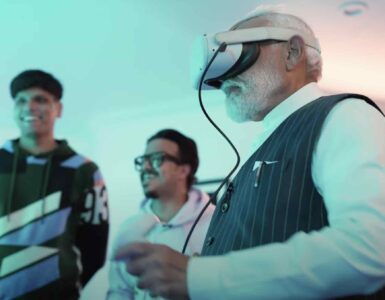There is an organized sector (that works under government guidelines) and there is the unorganized sector (that is not governed) — mostly relies on daily wages.
Then there is a Gig economy, which is basically a sector that employs people who work independently and on a temporary basis without being bound to any organization.
In the last few years, tech platforms have enabled a massive rise in the gig economy. Workers can choose where they work, how long they work, and work as long as they are satisfied.
The earlier generations believed in structured income and saving for retirement, which at times come at a cost of work-life balance. The millennial who are the main advocates of the gig economy joins the bandwagon not only for the lure of extra income and lack of employment opportunities otherwise — but also for the work satisfaction, flexibility, autonomy.
Cab aggregators like Ola & Uber, food delivery players like Zomato & Swiggy, supermarket & retailers, restaurants & hotels, and even large corporates in the organized sector employ thousands of these freelance workers.
Many of them are graduates and qualified professionals because finding a job that commensurates with their skill is difficult, hence freelancing becomes the easy option.
Freelancers also offer the option to work for multiple industries at the same time and the icing on the cake that many such jobs offer them the luxury to work from the comfort of their home. Jobs like software development, designing, content writing, market research, data analysis, etc. can easily be performed while sitting on the home couch, saving on the commute hassles.
The challenges of the Gig Economy
From Workers Perspective
Whether it is to find a suitable job (it requires personal marketing) and then with no steady workload and pay schedule, the workers in this sector live a life of unpredictability.
Underemployment, the risk of being fired by the business anytime, ambiguity on future work creates a lot of pressure for the Flexi workers.
While the income remains uncertain, but monthly rent, EMIs, expenses, are more or less established, which creates considerable mental health troubles (including depressions, blood pressure, etc.) for the people who work in a flexible job market.
Unlike a permanent job, the gig workers do not get privileges like health insurance, superannuation, and high-end learning opportunities, which many employers offer to their employees.
From the Business Perspective
It is not easy for organizations and start-ups to find the right talent for the job they had to offer and many times it leads to settling for an average employee. There are occasions when the business house needs to suddenly cater to spikes in demand, like during festivals or events, finding talent during that time is extremely hard, which not only causes harm to companies but also to the consumers.
From Government Perspective
The itinerant nature of this workforce makes it extremely difficult for the government to identify, classify, and account for this work-force. Most of the time, the government is unable to figure out if someone is employed or not, leading to inaccurate reporting of the employment data.
Another issue is monitoring the tax & compliance part, with many transactions happening through offline modes, the income reporting stays out of the picture.
Impact of COVID on the Gig Economy
The current lockdown due to the Coronavirus pandemic has made many jobs in the gig economy extremely shaky, with many have already lost their contracts and many others in the line.
Having said that, there is a likely chance that post-COVID, when things are back to normalcy, demand for the gig economy is going to spike.
Tourism, Aviation, Supply chain, Media & Entertainment, Transport, IT, and many other sectors will need human resources. There is a greater chance that a business would be more comfortable having contractual staff than a permanent one. Hence all is not lost.
The lines in the job contracts will also blur post-COVID, the so-called ‘non-compete’ clause (read below) will no longer be that sacrosanct, companies with extra capacity will be happy to release their employees on a temporary basis.
“a non–compete clause (often NCC), or covenant not to compete(CNC), is a clause under which one party (usually an employee) agrees not to enter into or start a similar profession or trade in competition against another party (usually the employer)” — Wikipedia
For example,
- An employee on a bench of a large multinational company can be released for a few days to work in a startup.
- A finance executive can work on a side project in the first 10 days of the month when there is less load with the primary employer.
- A senior consultant can also be taken on a contract basis for another agency.
- A business development executive can go on a sabbatical during the lean months to do sales for another company.
People who are already working in the gig economy will have a headstart and will be at the forefront of this revolution. It is only a matter of getting the right infrastructure and support from all the relevant stakeholders. All of this will need a system to manage and operate.
How can government help in enabling Gig economy?
A structured technology-driven portal, where the jobs in the gig economy are managed at a centralized level. The platform should offer full confidentiality and privacy for an individual to switch jobs. So suppose if someone wants to move from Uber to Ola, they can do so using this portal, without any restrictions or inhibitions.
Anyone seeking a job, whether it is a driver, plumber, electrician, maid, waiter, chef, housekeeping, graphic designer, android developer, anyone and everyone can become a user of the platform, of course with a certain level of KYC. While the businesses will have a common platform to search & find talent at a mass scale, the government will have better monitoring.
With technology like blockchain, the system can even have a mechanism to collaborate with educational institutes, government agencies, industry bodies, and corporates to establish a seal of approval of any user’s past record. Like state transport authority can validate the driving license and driving record of the potential recruit of Ola/Uber, or a university can validate candidate educational certificates.
Advantages of the portal –
- Instead of a random privately managed job-seeking platform (which is available currently like freelancer, Upwork, etc.), that doesn’t necessarily give complete details on the scale and size of the gig economy. This new government-managed platform will give an ability for the authorities to track this sector, like how many people are employed, where are they employed, employee grievances, etc.
- It can give visibility on the demand and supply gaps, such that necessary steps can be taken to address any problems.
- The portal can give recommendations to the job aspirants on the possible opportunities based on the skills, qualifications, employment history, previous employer feedback, etc.
- The business will have a trusted system from which they can source talent (suppose if we implement blockchain technology, the business will know if the candidate’s education qualifications or driving skills are completely attested and they don’t need secondary checks.)
- Traditional work benefits like health insurance, retirement plans, investment fund schemes can be offered (through government or private channels) to ensure adequate coverage in case of any eventualities.
- Can help people with disabilities and transgenders, who most of the time find difficult to search for a suitable job
- Considering the dynamic nature of job requirements, learning and sill enhancements need to be a continuous process. The platform can collaborate with an existing online education platform to help users in building job necessary skills including certification from recognized institutions.
- Multi-tasking is a new job description for many aspirants today, and such a platform is only going to propel and support this. It will enable the workers to do jobs with varying skill levels, like a graphic designer working as a driver in their spare time or a chef working as a photographer.
Lastly, as this workforce is mostly flexible in terms of their work style, they can be an effective soldier in nation-building. Mobilizing them for social causes like environmental issues, health services, pandemic situations, teaching & education, waste management, volunteering causes, traffic management, etc. could be at just click of a button.
Impact


USA, China, Brazil, Japan, and India are the top five countries for Flexi-staffing. According to Invest India, the country’s investment promotion and facilitation agency, the total addressable gig economy market is worth $3.4 billion. The gig economy has an amazing potential to address the country’s underemployment, unemployment, and skill demand problems. What information technology did for India’s service sector, Gig economy can be a country’s new sunshine sector.
The gig economy which mostly runs on technology needs a robust, sophisticated, and well-defined digital ecosystem to unravel its true potential. Enabling cross-pollination of different skills will not only create a healthier economy but also a united one. When individuals, companies, and governments learn to co-exist with the gig economy, the nation becomes the winner.






Add comment